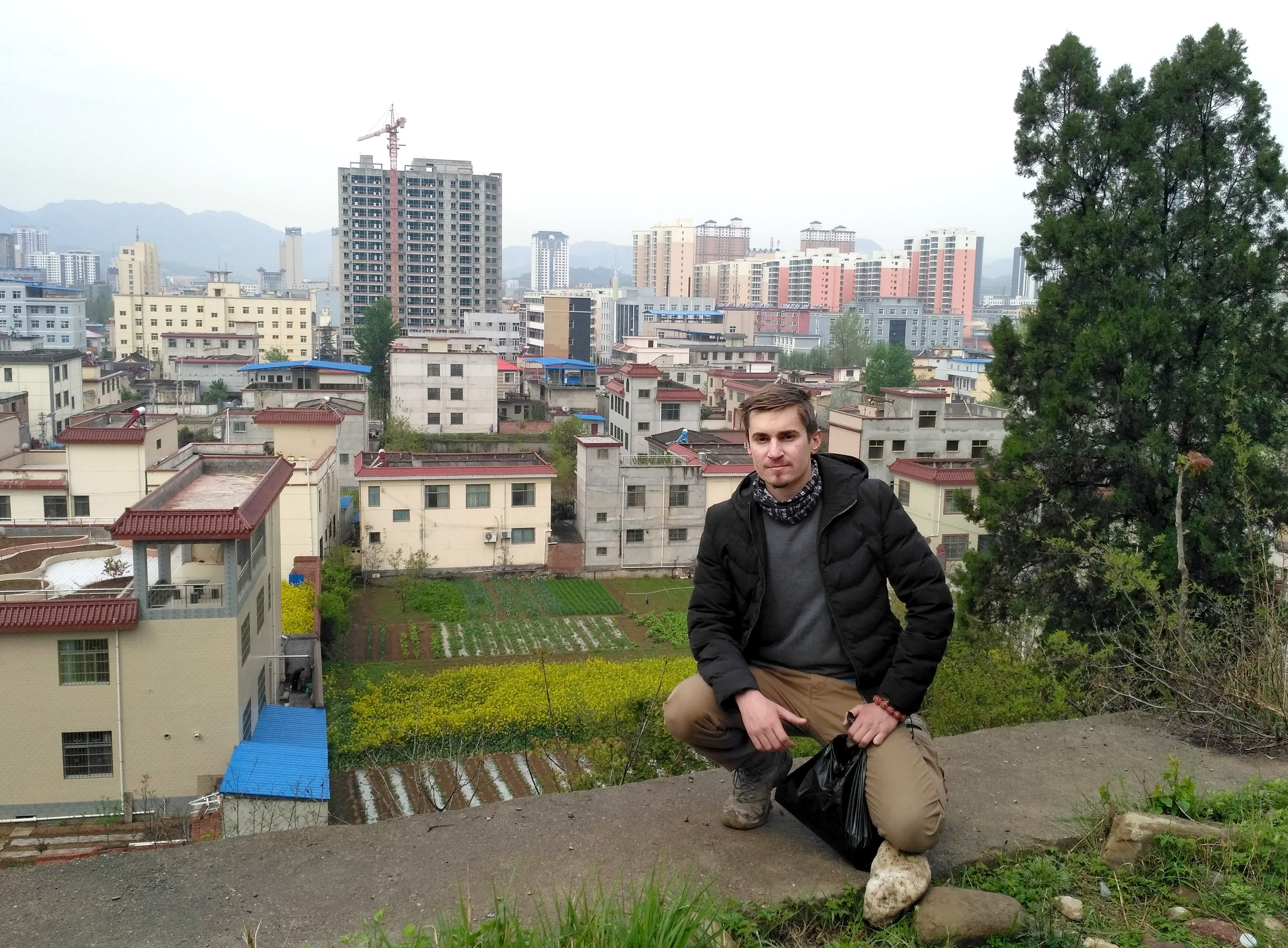 ,
, 
Luverne High School graduate Matt Christensen is a student in Nanjing, China, not far from Wuhan where the deadly coronavirus broke out.
He returned to Luverne in mid January for the Chinese lunar holiday and days later, the World Health Organization declared a global emergency.
His flight left Shanghai on Jan. 12, and on Jan. 23 China imposed travel restrictions. By the end of January public transportation in many major cities was shut down as the number of confirmed coronavirus cases continued to rise.
As of Monday, more than 18,000 cases of the pneumonia-like illness were confirmed worldwide and nearly 400 deaths.
‘Remain calm’
Meanwhile, Matt has been monitoring the situation from Luverne, where he’s staying with his mother, Pam Christensen.
“Since the coronavirus situation is changing so rapidly and there’s a constant flow of new information, my school has decided to delay the start of spring semester,” he said Monday.
“It could be by a few extra weeks — possibly early to mid-March. My guess is that in the meantime we will start classes normally, just online. I wouldn’t be surprised if, when we do return, we have classes on the weekend to make up for lost time and stay as close to our original closing date as possible.”
He said he’s going out of his way to cue into the World Health Organization.
“I trust that the experts at WHO, NIH and the CDC know what measures are best for overall global health,” Matt said.
“The best I can do is to be patient, remain calm and don’t panic while those who have spent their careers learning how to solve international issues like this do their work.”
His mother said she wouldn’t have been too calm had the timing been different.
“It’s hard on a good day to have Matt living half way around the world in China, but to think about how close he lives to the original outbreak is frightening,” Pam said Monday evening.
“To think that he was recently in Hong Kong and flew out of Shanghai is also frightening.”
She said she worries about air quality in general in the big city of Nanjing, but the possibility of airborne illness only increases those concerns.
“Think of all the people he encountered along the way; any one of them may have the virus and not even know it,” Pam said.
“I’m so thankful he left China before the virus became an outbreak. I’m so thankful he flew home when he did. I’m thankful that he is healthy.”
Training for foreign service
Matt is a 2009 graduate of Luverne High School and earned his bachelor’s degree in biology from Luther College in Decorah, Iowa, in 2013.
In 2017 he finished a stint in the Peace Corps in China near Tibet where he taught English at a university and learned how to speak Chinese.
That experience led him to enroll in classes at Johns Hopkins University School of Advanced International Studies.
He started school last fall at the Nanjing campus where he’s taking classes in U.S. Law in Global Perspective, Contemporary Chinese History, Principles of Economics, Cross-cultural Dialogue, etc.
“Most of the classes are in Chinese, so it’s been a big challenge for me,” Matt said.
“My job is to learn as much as I can about China while representing the United States while abroad. I recently lined up a job with the U.S. Foreign Service for after graduation, so this time in school has been great training for that.”
Virus first reported Dec. 30
The new coronavirus is thought to have originated in a food market of the central China metropolis of Wuhan where the illness has sickened more than 4,100 people and killed 224 in that city alone.
It has spread to about two dozen countries, including the United States. Deaths and cases are likely to rise until the outbreak is contained.
Nanjing, where Matt attends classes, is roughly 300 miles from Wuhan and only 150 miles from the nearby city of Zhejiang, which had reported 724 confirmed cases earlier this week.
According to recent news coverage of China’s response to the virus, many more may be sick with the virus than are diagnosed and confirmed.
It was reported Monday that the hospitals were running out of the test kits to confirm cases and because public transportation is shut down, many sick residents are unable to reach hospitals to be counted.
Amid global fears and some panic surrounding the coronavirus, Matt said he’s remained focus on his studies and remained in contact with his friends in China.
“My roommate lives in a Chinese city far away from Wuhan, but he said that everyone is staying home and avoiding crowded places as much as possible,” Matt said.
“Another Chinese classmate living near Wuhan told me that she’s been worried about the situation. They have enough food, but medical supplies like facemasks are low. The police require everyone in her family to take their body temperature twice per day. Mainly she passes the time reading, exercising at home and watching the news. Despite the worry, she’s proud of the thorough response that she’s seen her country make so far.”
‘People in China are like us’
He was eager to share information about the culture and people in China.
“The food is great and so are the people. If you ever go, make sure to eat beef noodles. They are my all-time favorite,” Matt said, adding that he plans to make dumplings while he’s in Luverne.
“People in China are like us. They are concerned about their families. They are concerned with the matters of their day-to-day lives.”
He said he’s dismayed to learn about race discrimination stemming from the coronavirus scare.
“Right now their biggest holiday season, typically a time of celebration and family gatherings, has been disrupted by an alarming international medical issue at their front door,” Matt said.
“In some places and news outlets there’s even been unwarranted panic and racially charged rhetoric around the coronavirus.”
World news aside, Pam said she’s just grateful to have her son home with her until the danger passes.
“As parents, we want our kids, grown or not, to be safe. If Matt had been trapped there, I would have had an overwhelming sense of helplessness and fear,” she said.
“The thought of him being stuck there is heartbreaking. It’s truly hard to think about … For now, I am beyond thankful that he is home and that Johns Hopkins has delayed the start of the semester.”
WHO offers basics on coronavirus
According to information from the World Health Organization, coronaviruses (CoV) are a large family of viruses that cause illness ranging from the common cold to more severe diseases.
These have included Middle East Respiratory Syndrome (MERS) and Severe Acute Respiratory Syndrome (SARS).
Coronaviruses are zoonotic, meaning they are transmitted between animals and people, and the new strain has not been previously identified in humans.
Common signs of infection include respiratory symptoms, fever, cough, shortness of breath and breathing difficulties.
In more severe cases, infection can cause pneumonia, severe acute respiratory syndrome, kidney failure and death.
The incubation period in humans ranges from 2 to 11 days, but could be up to two weeks.
The new coronavirus is a respiratory virus, which spreads primarily through contact with an infected person through respiratory droplets generated when a person, for example, coughs or sneezes or through droplets of saliva or discharge from the nose.
According to the WHO, standard recommendations to prevent infection spread include regular hand washing, covering mouth and nose when coughing and sneezing and avoiding close contact with anyone showing symptoms of respiratory illness such as coughing and sneezing.
The virus can live on surfaces for a few hours but is easily destroyed with common disinfectant.
Since antibiotics work only on bacterial infections, they do not work on viruses, such as the coronavirus.
To date, there is no specific medicine recommended to prevent or treat the novel coronavirus.
However, those infected with coronavirus should receive appropriate care to relieve and treat symptoms, and those with severe illness should receive optimized supportive care.
The WHO is working with global experts, governments and partners to rapidly expand scientific data on the new virus, to track the spread and virulence of the virus, and to provide advice to countries and individuals on measures to protect health and prevent the spread of the outbreak.
More information can be found at www.who.int.


